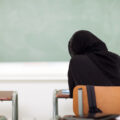Insights from the dashboard: Education across Europe
Insights from the dashboard: Education across Europe
Religious Education is a key topic of debate across Europe. For example, should schools offer courses on Christianity and Islam?
The EARS dashboard is a collection of summaries from European media articles on religion and society. Between 14 July and 14 October 2021, 864 article summaries were added by our analyst team. 37 of these, or 4% of the total, consider the topic of education. From the debate on the relevance of Christian Religious Education to the question of whether schools should offer Islamic education, the dashboard covers it all.
Teaching religion in schools
As outlined in our dossier on education, the role of Religious Education in schools varies among countries. For example, developments from Poznań, Poland, show that students’ interest in taking elective religion or ethics classes has been decreasing.[1] In Sweden, Roland Samuelsson, who ran for the Social Democrats at the Church of Sweden elections, also spoke out on the topic. According to him, the fact that schools teach less about Christianity is one of the reasons for the declining number of Church members.[2]
Finally, Austria has established ‘Ethics’ as a mandatory subject in secondary schools. This course includes not only philosophy and psychology but also parts of religious studies.[3]
Islam at school
In addition to ‘regular’ Religious Education, several countries are also struggling with accommodating Islamic studies at school. For instance, Greece has proposed prohibiting Muslim students and teachers from carrying out their religious rituals at school. This was immediately followed by an official request from the Turkish Foreign Affairs Minister to cancel these measures.[4]
On the other hand, in Spain, all public and charter schools are required to offer teaching of the Islamic faith during Religious Studies classes, if a minimum of ten families who have children at the school request it. Therefore, leaders of the Islamic community in the city have actively encouraged families to request the teaching. There are 310,000 Muslim school students in Spain, but only one in ten receive school education on Islamic religion.[5]
Collaboration
Even though religion and education seem opposed in several of the countries described above, this is not the case everywhere. For example, La Sapienze University of Rome and the Vatican are collaborating on cultural and scientific issues. The two institutions will cooperate on topics such as digital collaboration and transhumanism.[6] This shows how education and religion can also find ways to strengthen each other.
Learn more on the EARS dashboard
The EARS dashboard allows you to gain insight into a large number of topics, including education. It is a free tool that enables you to make similar connections as described above, and to find out about new relationships between interesting subjects across Europe. Please visit the dashboard to learn more.
Religion and education
Are you interested in learning more about the connection between religion and education across Europe? Dive into our education collection!
Sources
[1] Szkoły zbierają oświadczenia o uczęszczaniu na religię. Te o niezapisywaniu dziecka są nielegalne
[2] Fortsatt medlemstapp för Svenska kyrkan
[3] Wertehaltungen reflektieren
[4] Turquía pide a Grecia que cancele circular que prohíbe a maestros y estudiantes musulmanes realizar sus ritos religiosos
[5] Cuatro colegios de la provincia de Valladolid buscan impartir clases de religión islámica
[6] L’accordo tra il Vaticano e la Sapienza «Collaborazione culturale scientifica»






